
Monkey Island is a series of adventure games. The first four games were produced and published by LucasArts, earlier known as Lucasfilm Games. The fifth was developed by Telltale Games with LucasArts, while the sixth was developed by Terrible Toybox with Lucasfilm Games and Devolver Digital.
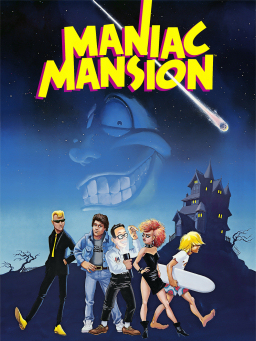
Maniac Mansion is a 1987 graphic adventure video game developed and published by Lucasfilm Games. It follows teenage protagonist Dave Miller as he attempts to rescue his girlfriend Sandy Pantz from a mad scientist, whose mind has been enslaved by a sentient meteor. The player uses a point-and-click interface to guide Dave and two of his six playable friends through the scientist's mansion while solving puzzles and avoiding dangers. Gameplay is non-linear, and the game must be completed in different ways based on the player's choice of characters. Initially released for the Commodore 64 and Apple II, Maniac Mansion was Lucasfilm Games' first self-published product.
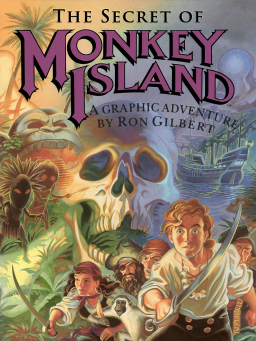
The Secret of Monkey Island is a 1990 point-and-click graphic adventure game developed and published by Lucasfilm Games. It takes place in a fictional version of the Caribbean during the age of piracy. The player assumes the role of Guybrush Threepwood, a young man who dreams of becoming a pirate, and explores fictional islands while solving puzzles.

Escape from Monkey Island is an adventure game developed and released by LucasArts in 2000. It is the fourth game in the Monkey Island series, and the sequel to the 1997 videogame The Curse of Monkey Island. It is the first game in the series to use 3D graphics and the second game to use the GrimE engine, which was upgraded from its first use in Grim Fandango.

Ron Gilbert is an American video-game designer, programmer, and producer. His games are generally focused on interactive story-telling, and he is arguably best known for his work on several LucasArts adventure games, including Maniac Mansion and the first two Monkey Island games. In 2009, he was chosen by IGN as one of the top 100 game creators of all time.
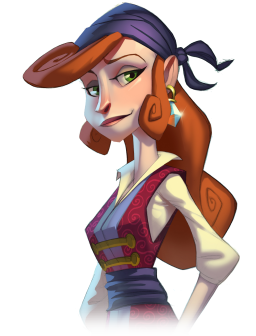
Elaine Marley is a character in the Monkey Island series of graphic adventure video games. Created by Ron Gilbert for LucasArts, the character first appears in The Secret of Monkey Island and is one of the core characters in the franchise. Originally conceived as a ruthless island governor, the character evolved during development into the protagonist's love interest. While the first two games in the series did not feature voice acting, Elaine was voiced by Alexandra Boyd in The Curse of Monkey Island and by Charity James in Escape from Monkey Island; Boyd would reprise the role for later entries in the franchise.
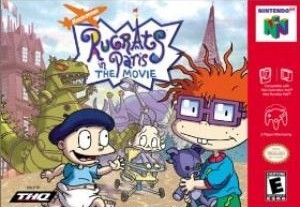
Rugrats in Paris: The Movie is a video game based on the 2000 animated movie of the same name. The game follows the adventures of the Rugrats in a European theme park. A console version of the game was released in 2000, for the PlayStation, Nintendo 64, and a handheld version for Game Boy Color. A version for Microsoft Windows was later released in 2001. The console version's gameplay is similar to Rugrats: Studio Tour, but Paris’ attractions sometimes have minigames too. The handheld gameplay is a side-scrolling platformer. The Windows version's gameplay is an adventure game in which the player must find Chuckie's Wawa Bear.

Indiana Jones and His Desktop Adventures is a 1996 adventure video game. Desktop Adventures was made to run in a windowed form on the desktop to limit memory use and allow the player to perform other tasks. This game was the first Desktop Adventures game, and was followed by Star Wars: Yoda Stories in 1997.
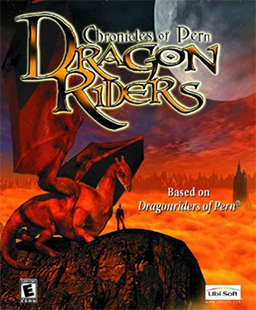
Dragon Riders: Chronicles of Pern is an adventure game published by Ubi Soft in 2001.

Wonderland is an interactive fiction game developed by Magnetic Scrolls and published in 1990 by Virgin Games.

Odyssey: The Search for Ulysses is a video game released in 2000, developed by In Utero and Cryo Interactive.
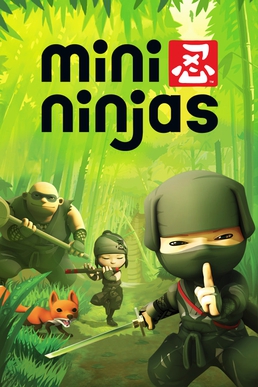
Mini Ninjas is a 2009 action-adventure game developed by IO Interactive and published by Eidos Interactive for Microsoft Windows, Nintendo DS, PlayStation 3, Wii and Xbox 360. A Mac OS X version of the game was released on July 8, 2010, by Feral Interactive. In December 2011, it was announced that the game would be also made available as a browser game for Google Chrome.
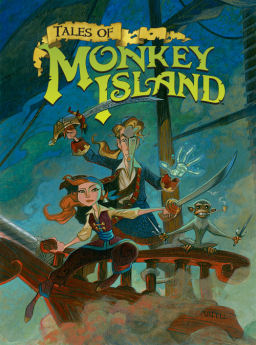
Tales of Monkey Island is a 2009 graphic adventure video game developed by Telltale Games under license from LucasArts. It is the fifth game in the Monkey Island series, released nearly a decade after the previous installment, Escape from Monkey Island. Developed for Windows and the Wii console, the game was released in five episodic segments, between July and December 2009. In contrast to Telltale's previous episodic adventure games, whose chapters told discrete stories, each chapter of Tales of Monkey Island is part of an ongoing narrative. The game was digitally distributed through WiiWare and Telltale's own website, and later through Steam and Amazon.com. Ports for OS X, the PlayStation Network, and iOS were released several months after the series ended.

The Immortals of Terra: A Perry Rhodan Adventure, known in the United Kingdom as Rhodan: Myth of the Illochim, is an adventure game developed by Braingame and published by Koch Media and Viva Media for Microsoft Windows in 2008.

Jacob Jones and the Bigfoot Mystery is a popular episodic puzzle adventure developed by Lucid Games. Part 1 was original published by Sony Computer Entertainment on PlayStation Vita on May 14, 2013, and later on iOS on May 16, 2013. Episode 2 was released on iOS on July 24, 2014. It had since been removed from all app stores. Both episodes were also made available for Windows via Steam.

Thimbleweed Park is a point-and-click adventure game developed by Ron Gilbert and Gary Winnick for Linux, macOS, Windows, Xbox One, PlayStation 4, iOS, Nintendo Switch, Android, and Amazon Luna. The game was revealed on November 18, 2014, along with a Kickstarter crowd-funding campaign with a goal of US$375,000, and was released on March 30, 2017.

The Arrival is a 1997 adventure game developed by Enteraktion and published by Live Interactive. It was released on Mac and Windows. It's an adaption of the film of the same name.
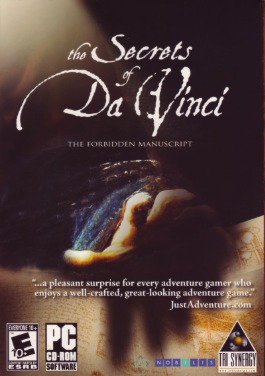
The Secrets of Da Vinci: The Forbidden Manuscript is an adventure game developed by Kheops Studio and published by Tri Synergy on June 7, 2006 on the PC. In 2009 it was released on the Mac OS X.
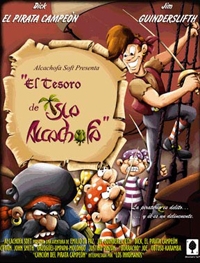
El Tesoro de Isla Alcachofa is a 2000 Spanish video game by Alcachofa Soft. It is the first video game the developers made under their newly incorporated company 'Alcachofa Soft'.
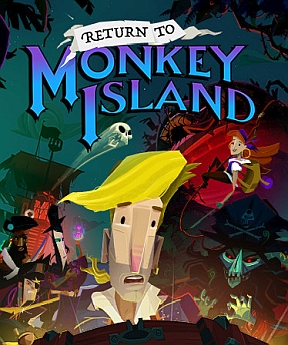
Return to Monkey Island is a point-and-click adventure game developed by Terrible Toybox and published by Devolver Digital. The sixth Monkey Island game, it was released for macOS, Nintendo Switch, and Windows on September 19, 2022, for Linux on October 26, 2022, for PlayStation 5 and Xbox Series X/S on November 8, 2022, and for iOS and Android on July 27, 2023. It was the first Monkey Island game by the series' creator, Ron Gilbert, since Monkey Island 2: LeChuck's Revenge (1991).




















